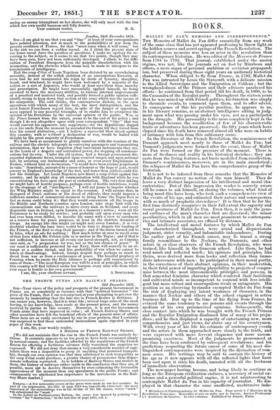London, 24th December 1851.
Sin—I am glad to see that you and "One" at least of your correspondents bare pointed attention, not so much to the probabilities of war from the present condition of France, for that "must come when it will come," but to the risk we run from a sudden inroad. As I think the present state of our home naval force the question of questions, I make no apology for re- curring to the subject, as it seems to me that two points, though they may have been seen, have not been sufficiently developed. I allude to the diffi- culties of. President Bonaparte from the palpable dissatisfaction with his usurpation, and the obstacles which steam may be made to interpose to the transmission of intelligence.
Had the coup d'etat of Louis Napoleon been dictated by an overwhelming necessity, instead of the selfish ambition of an unscrupulous Terrorist, or even had he not inaugurated his reign by deeds of tyranny, slaughter, fraud, and falsehood, he might have been welcomed by a majority of the nation as a sort of Augustus, who would at least save them from anarchy and proscription. He might have successfully. applied himself, he being assumed to have the necessary abilities, to various internal improvements of a practical and material kind, and possibly formed a public opinion suffi- ciently strong to keep down that section of the army which was the means of his usurpation. The cold dislike, the contemptuous disdain, or the open opposition with which many of the best, the most distinguished, and the most honest Frenchmen regard him, in spite of the danger of opposition, scent opposed to any peaceful triumphs, or to enable him to overpower the opinion of his Pretonans by the universal opinion of the public. War, as the Times foresaw from the outset, seems to be the end of his policy ; and though I do not altogether agree with your correspondent " One" that war would convert his opponents into supporters,—for the Republicans dogged even his uncle from the moment he ascended the throne till they forced from him his second abdication,—yet I believe a successful blow struck against this country, with or without a declaration of war, would be hailed with delight by the great majority of Frenchmen.
We have been so accustomed to glorify ourselves with the wonders of the railway and the electric telegraph in conveying passengers and transmitting information, that we have forgotten what convenient instruments they are, in the hands of a despotic and centralized power, for stopping all communi- cations but its own. Under the old system, had a foreign government dis- regarded diplomatic forms, trampled upon received usages, and upon national law, by arresting our Ambassador and suite, or even every Englishman in France, without hint or declaration, " it would have been a crime perpetrated in vain." Somebody, animated by a sense of honour or the hope of gain, would convey to England a knowledge of the fact, and faster than soldiers could fol- low his footsteps. Let Louis Napoleon now direct a coup d'etat against this country, and he might stop all communication with England while he was concentrating his force upon the port of embarkation. The very first inkling we might have of hostile purposes, perhaps even of hostile intentions, would be the stoppage of all "intelligence." I will not pause to inquire whether the Whig Ministry might be equal to the occasion. I will assume that, in disregard of Peace orations or the dread of ridicule, they would impress a sufficient number of commercial steamers to bring home the Tagus fleet as fast as steam could bring it ; that they would concentrate all the troops in the Middle and Northern counties upon London, take steps both with the commandants and the railways to move every man in Scotland, and every disposable man in Ireland, upon London at a moment's notice ; warn all the Pensioners to be ready for service; and probably call upon every man who had ever been even drilled, to inscribe his name with a view to enrolment as a reserve force for peace purposes, at least in the districts denuded of troops. An energy like this might (or might not) cover London ; it is very doubtful whether the land force would be in time to dispute the landing of the French, or the fleet to stop their passage ; and if the alarm turned out to be false, what an ado for nothing ! How much better at once to recall some of that force which Mr. Cobden tells us is useless in the Tagus ; and if that is not sufficient, to increase at all events our naval strength, not, as Canning once said, as "a preparation for war, but as the last chance of peace." If our coast is sufficiently protected by our Navy, there will scarcely be an at- tempt at a sudden inroad, and less probability of war when we cannot be taken at disadvantage. Indeed, foreign despots have perhaps as much to dread from war as from a continuance of peace. The boastful prophecy of Canning when be smote the Holy Affiance is perhaps still remembered by some of them—" The next European war will be a war of principles, in which this country will find inlisted under her banners every man who from what- ever cause is hostile to his own government."


























 Previous page
Previous page